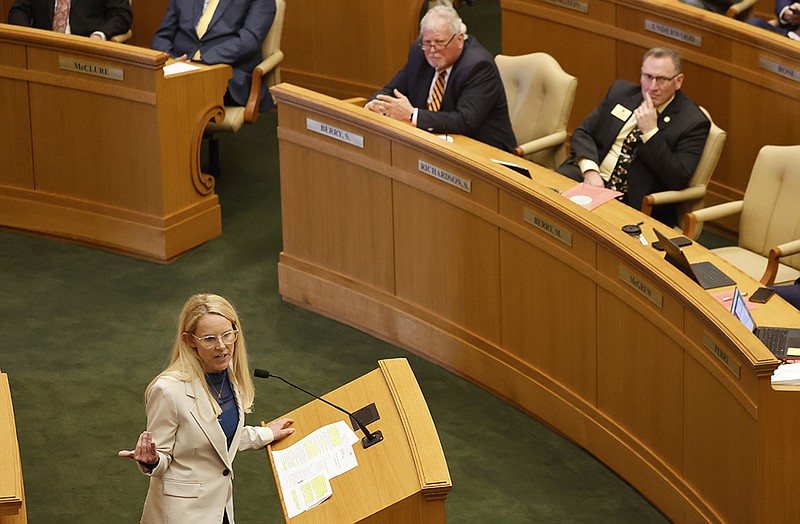A proposed bill to reduce Arkansas' veterinarian shortage has divided clinicians and lawmakers.
House Bill 1182, sponsored by Rep. DeAnn Vaught, R-Horatio, would allow for veterinarian technician specialists to prescribe drugs and perform minor surgeries to help expand access to healthcare to house pets and livestock in the state. The bill passed the House last week and is scheduled to be taken up Tuesday by the Senate Committee on Agriculture, Forestry and Economic Development.
The bill is controversial among veterinarians, with some arguing it would be contrary to federal rules regulating drugs and make veterinarian technician specialists equivalent to doctors of veterinarian medicine. Vaught, and some veterinarians, argue it is a necessary step to alleviate a need, particularly in rural communities where their demand is the highest.
"To me, it's no different than nurse practitioners," Vaught said. "We did not have enough doctors, so what we did was we let nurse practitioners do more and more to help with the shortage of doctors. And we got that same shortage with veterinarians."
If passed, veterinary technician specialists would be able to seek approval from the Veterinary Medical Examining Board to prescribe drugs and perform minor surgeries. Under the bill, veterinary technician specialists would not be able to practice on their own, instead needing the approval from a "collaborating veterinarian" to receive the new authority. Additionally, veterinary technician specialists would have to complete eight hours of "advanced continuing education in his or her area of specialty each year before veterinary technician specialist certification renewal."
Veterinary technician specialists are senior-level veterinary techs who have received extra training and certification. Vaught likened veterinary technician specialists to nurse practitioners, who receive extra certification to treat patients.
Currently, there are no veterinary technician specialists certified in Arkansas, according to Dr. Everett Rogers, president of the Arkansas Veterinary Medical Association.
"It just seems like this bill addresses a situation that is not applicable right now," Rogers said.
The federal government, which maintains strict control over medical prescriptions, also would have to change its rules before veterinary technician specialists can begin to prescribe drugs, Vaught said. Rogers said federal regulations help prevent the over-prescription of antibiotics, which has become a growing issue for some health experts, or the abuse of controlled substances.
"These regulations are very important as we are facing worsening drug abuse in our society," Rogers said.
Arkansas ranked last in the nation in veterinarians per capita, with 14 veterinarians per 100,000, according to a recent analysis by veterinarians.org. The state also has no veterinary schools, although that will change soon with Arkansas State University and Lyon College announcing plans to establish their own programs.
Instead, Arkansas' future veterinarians have had to venture out of state, usually to universities in Louisiana, Mississippi, Missouri, Oklahoma and Tennessee for their formal education.
Vaught said her bill was "kind of a Band-Aid," but could provide critical relief to farmers and their animals, and veterinary technician specialists could be a force multiplier for rural communities who lack access to veterinary medicine.
The bill would limit the number of veterinary technician specialists who could enter into a "collaborative practice agreement" to three. The bill also would require the veterinarian to personally see the animal within 15 days after the technician specialist administers care.
Dr. Tabitha Norris, a veterinarian from south Arkansas, spoke in favor of the bill at its hearing earlier this month saying it provides relief to overwhelmed clinics.
"Our profession is overwhelmed and emotionally worn," Norris said. "Veterinarians are in short supply and often need abbreviated schedules for various reasons. It's difficult to get veterinarians to rural areas without the amenities of a large city."
